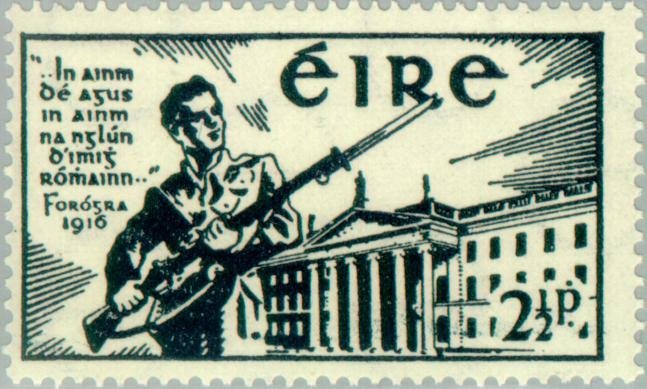Easter stab in the back
The Irish rising of 1916 and British repression

Commemorative stamp for the 25th anniversary of the Easter Rising issued by the Republic of Ireland in 1941. The stamp depicts a young rebel, with the General Post Office in Dublin behind him, from where the rebels proclaimed the birth of a free and republican Ireland. - Commons Wikimedia.
In 1916, while all of Europe was focused on the war, something occurred in Ireland that would change the course of the country's history. On April 24, approximately 1,500 armed rebels, members of the Irish Volunteers and coordinated by the Irish Republican Brotherhood, seized strategic locations in Dublin and proclaimed the birth of the Republic of Ireland.
The rebels counted on the British being too preoccupied with the war on the continent to respond effectively. However, the British, precisely because of the war, believed it essential to crush the Irish rebellion with the utmost severity, perceiving it as a betrayal during a time of national crisis. British forces, comprising both police and military units, laid siege to Dublin, employing armored vehicles. Several city streets were destroyed by army shelling, resulting in the deaths and injuries of numerous civilians. Around 2,000 people were arrested, and 16 leaders of the uprising were sentenced to death.
The harshness and methods of the British response sparked widespread criticism and dismay both domestically and internationally. Notably, the United States, which would enter the war on the United Kingdom’s side the following year, was outraged by the secrecy and arbitrariness of the trials that led to the execution of the rebellion’s leaders. Even the Irish Catholic episcopate, traditionally cautious regarding independence movements—partly to maintain good relations with the British authorities and partly due to the republican and socialist ideals of many rebels—condemned the severity of the British crackdown.
The British reaction also convinced the majority of Irish citizens of the necessity for full independence, rather than mere autonomy under "Home Rule", which London had granted in 1914. The rebels sentenced to death quickly became, in the eyes of the Irish people, heroic martyrs who had fallen in the fight against British oppression. What came to be known as the "Easter Rising" of 1916 remains a pivotal event in Irish national memory and identity.
Lucia Ceci, La fede armata. Cattolici e violenza politica nel Novecento, il Mulino, 2022
2025-05-17
Salvatore Ciccarello
